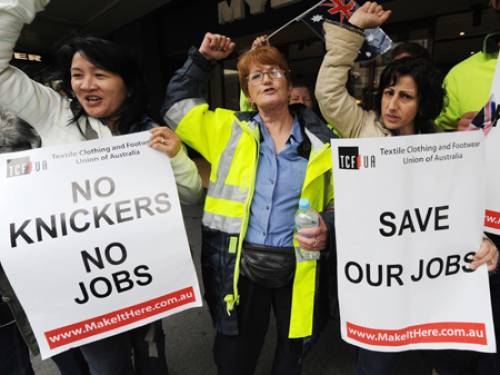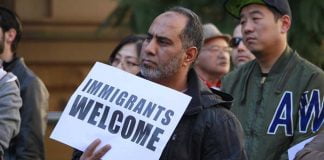The suggestion that bringing 457 visa workers from overseas is coming at the expense of “local jobs” reinforces the myth that immigration causes unemployment and drives down wages.
In fact evidence from Australia and internationally shows that immigration actually creates jobs. In his book, Immigration and the Australian Economy, William Foster’s surveys over 200 studies on immigration and wages. He found there was, “a marginally favourable effect on the aggregate unemployment rate, even in recession”.
In a 2003 paper economist Hsiao-chuan Chang wrote that, “there is no evidence that immigrants take jobs away from the local Australian over the past twelve years… This supports the conclusion from existing research”.
This is because new migrants generate demand for products and services, such as housing and food. Many of them bring savings to help pay for these things, further boosting the economy and jobs.
Wages
But because new migrants are often forced to accept lower-paid jobs or cash-in-the-hand that might be lower than union wages, there is a common belief that this can drive down wages and conditions, especially in low-skill areas of construction and manufacturing.
Union leaders, for instance CFMEU national secretary Dave Noonan, have argued that 457 visas are a way that, “Australian businesses use the [immigration] system to avoid paying decent wages”.
But studies have shown that immigration has no significant effect on wages.
Ross Garnaut, in a report prepared for the Immigration Department, found, “The conclusion that, for Australia at least, there is a positive effect of population growth on average incomes is broadly consistent with the weight of recent economic opinion”. And low-income earners saw their wages increase proportionally more than other groups.
In fact some research indicates immigration may slightly increase wages. The opening of the UK to higher immigration from Eastern Europe after eight new countries joined the EU in 2004 was a demonstration of this effect.

It provided a particularly good opportunity to test the impact of immigration, as the 560,000 new migrants that arrived over two years in Britain were concentrated in particular areas. Some areas received many new migrants and others very few. Only a tiny difference in wage rates between these areas was observed, but the wages in areas of higher immigration were marginally higher.
It’s undeniable that migrants have been used at individual worksites to undermine wages. But bosses do the same thing with “local” workers all the time, through trying to replace permanent workers with casuals and looking to undermine union organisation.
Low wages and job cuts are caused by bosses’ cost cutting in order to boost profits. Migrant workers on 457 visas were not responsible for the recent job cuts at Ford or Darrell Lea.
Historically there is no connection between immigration and unemployment. In the 1930s for example there was virtually no immigration yet unemployment went to over 30 per cent.
In the early 1990s, net migration fell from 160,000 in 1989 to just 30,000 in 1993, but unemployment continued to grow.
Over the last 12 months, 62,610 workers arrived on 457 visas. At the same time total employment climbed by 123,400 of which 59,300 were full time jobs and unemployment has trended down.
Living off welfare?
Another claim is that immigrants move here so they can live off welfare payments, wasting government resources.
New immigrants do tend to have higher rates of unemployment than the rest of the population. Migrant workers have always been forced to fill the worst jobs and are often the first to be sacked when recession hits.
But research by anti-immigrant academics Bob Birrell and James Jupp found that, “overseas-born persons showed slightly lower welfare-recipient rates than their Australia-born counterparts for each age group”. Despite this the Howard government vindictively banned new migrants from accessing any social security benefits for their first two years in the country.
Blaming migrants for unemployment, low wages and the state of public services is nothing more than racist scapegoating.
It is the standard line of racists like Pauline Hanson, who called for a halt to immigration, “so that our dole queues are not added to”. It diverts people’s anger away from the profiteering bosses and government cutbacks that are the real cause of these problems.
Racism divides workers and weakens the struggle in the workplace for decent wages.
Our unions are stronger when they take a stand against racism and the bosses’ attempts to divide and rule.
James Supple





